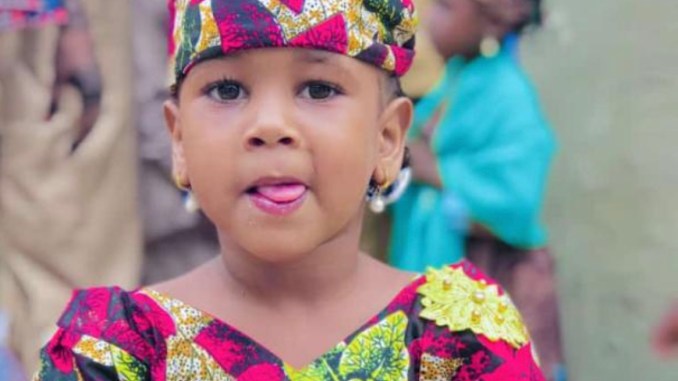Like all Nigerians, we received Thursday news of the abduction and eventual gruesome murder of 5-year-old Hanifa Abubakar somewhere at Kawaji, Yankaba area of Kano city with anguish. As this newspaper reported Saturday, Hanifa had been abducted since early December by the proprietor of the school she attended, Abdulmalik Muhammad Tanko, while returning home from Islamiyya. Tanko held her captive for weeks in his own home, and then poisoned her, cut her body in pieces, and buried her remains in a shallow grave in one of the two schools he runs, all the while taunting the parents to pay a N6 million ransom for her release.
The murderer confessed all of these by himself after he was apprehended by a combined team of the Police and men of the Department of State Security Services (DSS) while trying to collect the ransom money for a captive he had already killed and decapitated. His wife and two others, Hashim Isyaku and Fatima Jibreel Musa, all of Tudun Murtala Quarters, Nasarawa Local Government Area of the state are accomplices.
Hannifa’s father, who spoke to reporters amidst tears said, “those who did this to me have not been fair to me, neither have they been fair to the world. God will fight for us”. Indeed. But that fight must start here and now.
It is difficult to pinpoint which of Tanko’s acts in this chain of events is most gruesomely heartless. Is it the abduction of a 5-year-old girl who calls you ‘Uncle’, the favoured name our kids refer to their teachers? Is it waking her up from sleep and killing her with rat poison in a cup of tea? Is it watching her writhe in pain as the poison ravaged her essential organs until she died? Is it cutting her dead body in pieces, or burying her remains in the same school where other school kids would gather the following day to attend classes?
And yet, the circumstances such as had befallen Hanifa is becoming commonplace in our society in recent years. Even as we try to understand the Hanifa case, let alone recover from it, one Kabir in Zaria had kidnapped and killed 8-year-old Asma’u, fondly called Husnah by her parents, after collecting N3 million in ransom. Kabir is reportedly a neighbour to the Husnah’s parents. Also, on January 12 one Auwalu Abdulrashid, a 21-year-old man, reportedly confessed to killing and burying a 13-year-old hawker in Kano State. And in May last year, 6-year-old Muhammad Kabir was found dead in a Kaduna drainage, a week after he was taken and N5 million ransom paid for his release. Similar cases have been reported in Lagos, Rivers and Enugu and other states of the country in recent months.
Making sense of all of these is hard. But for our own good as a society, we must try. Unlike bandits roaming our forests and rampaging on our highways, the abductions of minors have occurred within victims’ homes, neighbourhoods and schools—the three spaces in which children spend almost their entire time—and by people we would otherwise call neighbours, teachers, and even friends or family members. That is, the perpetrators of these crimes are people we trust one way or another, but who harbour the darkest intents and lurk around our neighbourhoods for the next child victim to pounce upon. In other words, these chilling events represent the near complete breakdown of the moral order and social trust in our society today.
Second, these events also reflect the banalization of taking human life in Nigerian society today. The circumstances in which Nigerian life is lost are simply too cheap. From stray bullets by agents of the state, to ransacking of whole villages and communities by terrorists of all colours, to killings by all sorts of criminals like kidnappers, cultists and armed robbers, to routine assassinations, and even simple fights between ordinary citizens, it has become all too easy to take human life in this country without any consequences whatsoever for the perpetrators, let alone any form of closure or compensation for victims’ families.
This is not something to which all accusing fingers should point to the state, as we are always too quick to do, but something in which we are all caught up and play a part, if for nothing else by the ease with which we forget and ‘move on’ to the next senseless atrocities involving human life. But as sociologists and social historians know only too well, collective memory is the most powerful too by which a society reproduces and re-enacts its moral values. If we all do not forget but remember, then we are all more like to say, with one voice, “no, never again must we witness such a thing among us”.
Collective memory about what is acceptable and what is not to a society is thus a social force on which all law and order is moored. We seem to have lost this over the past few decades, but we must reclaim it for our laws to function well enough to deal with situations such Hanifa’s senseless murder. As we wish her gentle soul eternal rest, we urge the authorities—particularly the police, the courts and the government of Kano State—to rise to the occasion and make her life a turning point by giving her and all victims of such murders the justice they deserve.

 Join Daily Trust WhatsApp Community For Quick Access To News and Happenings Around You.
Join Daily Trust WhatsApp Community For Quick Access To News and Happenings Around You.


